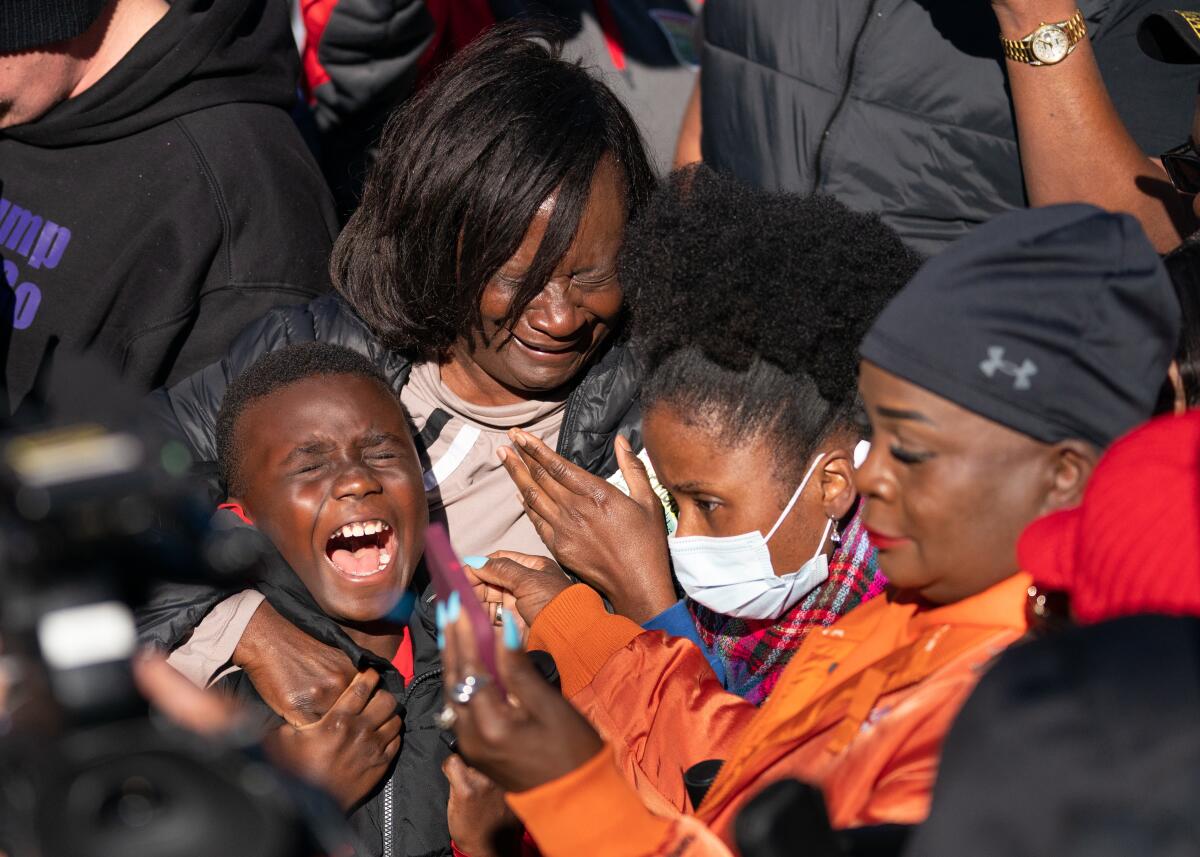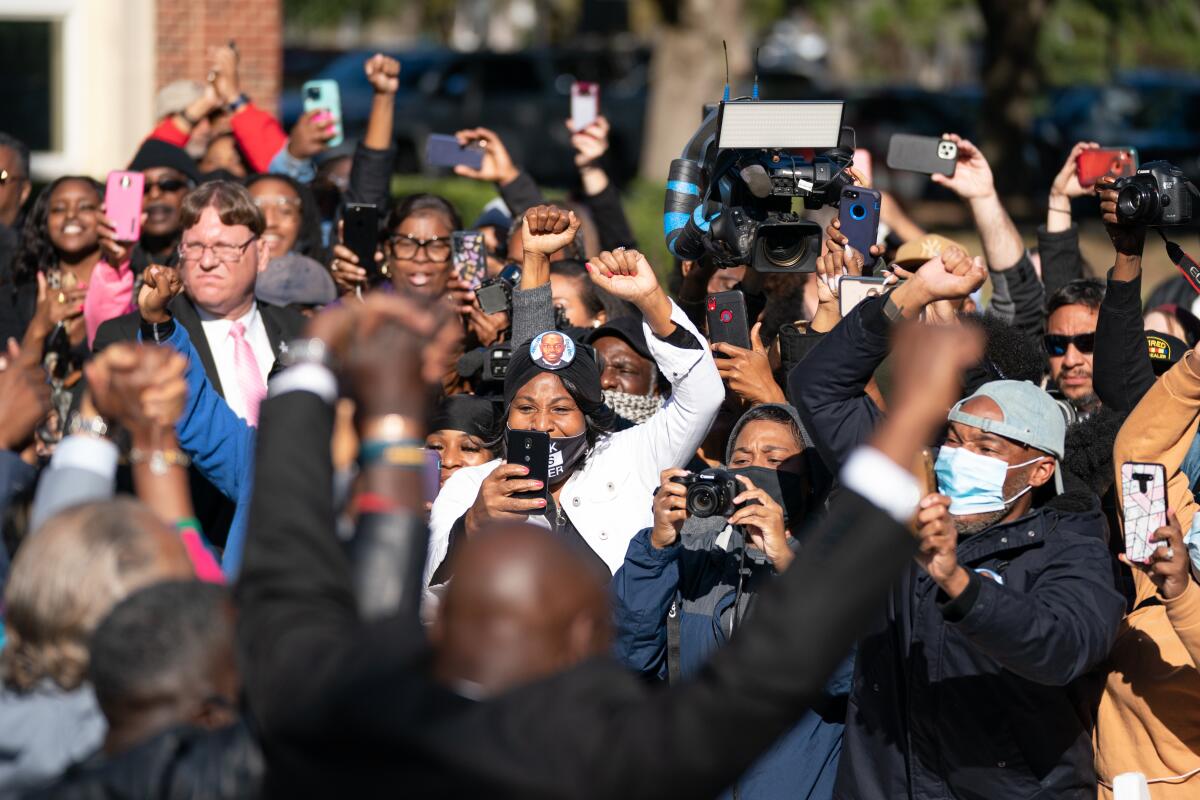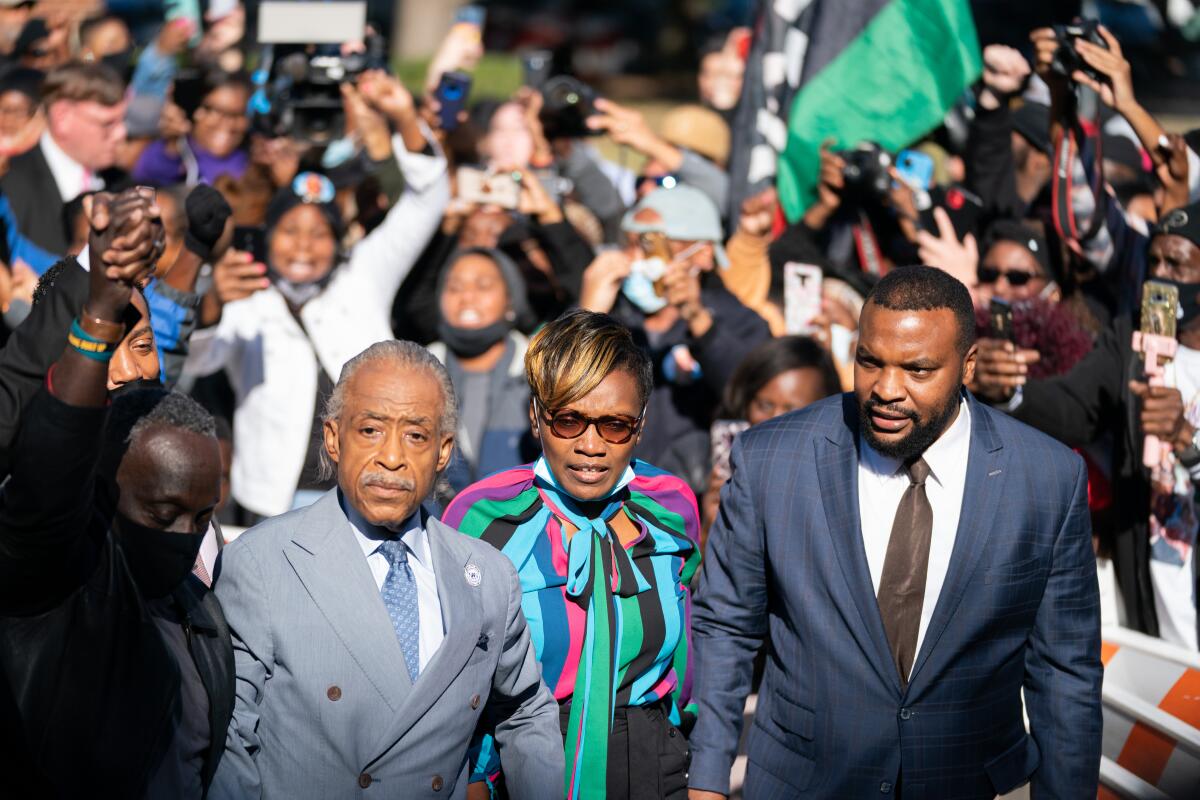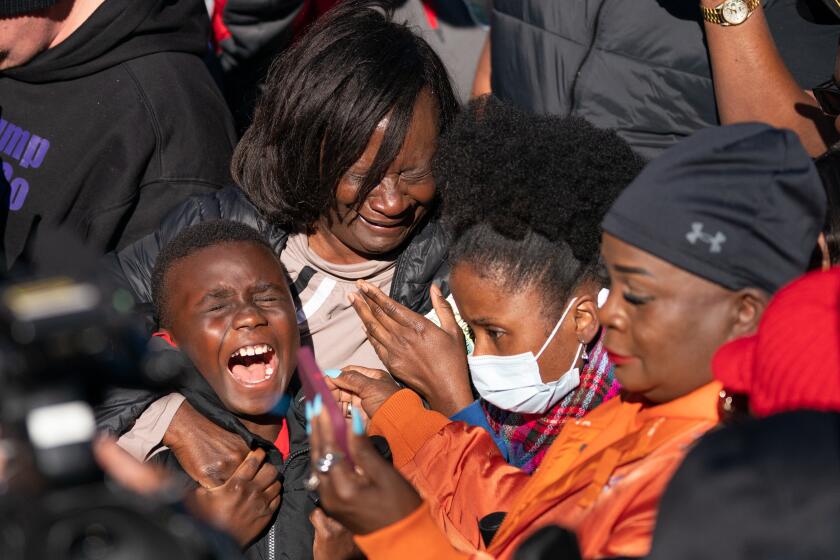America and Ahmaud Arbery: Guilty verdicts in Georgia bring ‘that small glimpse of hope’
Ahmaud Arbery’s mother says she is thankful for justice but that the murder convictions of the men who cornered and killed her son won’t bring him back.
BRUNSWICK, Ga. — Relief, yes. Rejoicing — that’s more complicated.
The murder convictions of three white men who killed Ahmaud Arbery on a suburban street in Georgia last year drew broad approval across the United States on Wednesday, even from many conservatives who agreed that justice demanded the trio be held accountable for chasing and shooting an unarmed 25-year-old Black man who was running through their neighborhood in shorts and a T-shirt.
From a courtroom in the Deep South, where 11 of 12 jurors were white, it seemed common ground had been found after nearly two years of a national reckoning on race. But while the verdicts in Brunswick were widely applauded, many saw an America still grievously beset by injustice, with an uncertain path to genuine reconciliation even as the offenders were led away in handcuffs and Arbery’s family celebrated a victory that had eluded others like them for generations.

The guilty findings against Gregory McMichael, his son, Travis McMichael, and neighbor William “Roddie” Bryan came at a particularly fraught moment — a backdrop of relentless political rancor, exacerbated by exhaustion over a deadly pandemic that has been grinding through and reshaping America like an unending trauma.
A time of anger, despair and little repose. Then again, on this Thanksgiving eve, when a mother’s anguish was eased in head-bowed prayer and joy echoed from the courthouse steps, many saw a day of satisfying vindication.
Outside the Glynn County courthouse, not far from the salt marshes and rivers that thread around this city of Victorian homes, retired city government clerk Delores Polite beamed.
“I was skeptical because of old history,” said the 65-year-old community activist, whose ancestors were auctioned as slaves in the port of Charleston, S.C., 130 miles up the Atlantic Coast. “But this is new history.”
For a case whose details unfolded in such wrenchingly intimate fashion, its scope was nonetheless seen as far-reaching, much like the police murder of George Floyd, whose death galvanized the Black Lives Matter movement. David Anderson, a Black megachurch pastor in Columbia, Md., said that to him, the outcome encompassed “much more than Arbery.”

“Our nation is sorely divided on race,” said Anderson, 55, an author and radio host who leads the Bridgeway Community Church, a multiracial congregation with a large Black membership. The guilty verdicts, he said, “give us that small glimpse of hope, that justice can roll down like water.”
The recent acquittal of Kyle Rittenhouse, who killed two people and injured a third with an AR-15-style rifle he brought to a tense protest scene in Wisconsin, was a far more polarizing case than this one. Rittenhouse, 17 at the time of the shootings, was lionized by the right and feted by former President Trump, but support for Arbery’s assailants was much more muted, even among self-described conservatives.
Howard Vestal, 78, of Dallas, an Air Force veteran and retired architect who volunteers with the Texas chapter of Gun Owners for Safety, called the verdict appropriate.
“Responsible gun ownership is the only kind of gun ownership we can tolerate in a democracy,” he said. “The people that shot and killed Arbery — there’s an intimidation factor to people carrying guns, even though it may be done lawfully. That’s a threat to all of us, to our democracy. Gun violence is getting closer and closer to touching all of us.”
Three white men were found guilty of murder Wednesday in the shooting death of Ahmaud Arbery, a 25-year-old Black man
For others, though, Arbery’s killing was a devastating illumination of how racial inequities render mundane activities a deadly risk. In Orangeburg, S.C., tears trickled down Justin Bamberg’s face as he heard the word “guilty” repeatedly intoned on live TV from the courthouse.
Bamberg, a 34-year-old Democratic state representative, has represented families in several high-profile cases after police shootings, including that of Alton Sterling in Baton Rouge, La., in 2016. “Today is a solid day of progress for our country,” he said. “This is a verdict we have longed for.”
But Bamberg said that as a Black man, he did not feel any safer engaging in normal activities such as running on the street, as Arbery was doing when he was stalked and attacked.
Among many watching with horror from across the country and the world, the slaying of Arbery conjured up the brand of brutal violence that was long associated with the American South of generations past, replete with lynchings and repressive Jim Crow laws.
Yet in Brunswick, a small port city about 80 miles south of Savannah, Ga., residents were likelier to say that their home had not traditionally been known for extreme racial violence.
Theawanza Brooks, 37, an aunt of Arbery who sat in the courthouse taking notes throughout the trial, said her nephew’s death stood out from anything she had experienced before. Growing up here and attending Brunswick High School, she said, she did not experience racism and never had a reason to think race was a factor in how she was treated.
“I was taught to love everyone,” said Brooks, who is an assistant manager of a retail store. “But this one stands out, because this is like a modern-day lynching from 400 years ago. To think that we were free of those times, and then for this to happen, it just kind of set me back mentally.”
Republican leaders in Georgia condemned Arbery’s killing and said vigilante-style violence had no place in their state. Republican Gov. Brian Kemp responded to Arbery’s shooting in February 2020 by signing into law the state’s first hate crimes bill in June of that year, which imposed additional penalties for crimes motivated by bias.
In May of this year, Georgia repealed the state’s citizen’s arrest law and significantly restricted the ability of anyone who is not a certified law enforcement officer to arrest someone. Kemp called the old law “antiquated” and “ripe for abuse.”
“I just think it’s the right thing to do,” Kemp told a Savannah TV news outlet at the time. “What we saw in the Ahmaud Arbery case ... that’s not the state of Georgia I know. We’re better than that.”
It seemed in many quarters the vestiges of the past were expiring in a nation that for so long had failed to confront the sins and injustices on which its foundations rested. The Arbery verdict was the latest notation in a slowly changing ledger.
Some in Brunswick, though, believed their community had been tarnished by the case, in ways they felt did not square with the town they knew.

“Everyone has an opinion that the South is racist, but I find African Americans and whites really get along well here,” said Bill Hestor, who works as a dock master at a marina not far from the courthouse.
A 59-year-old white man who considers himself a conservative, he said he hoped the outcome would bring healing — although he questioned whether Bryan, the third defendant, should face as harsh a penalty as the father and son who initially gave chase.
But for many, merely avoiding what would have been regarded as a worst-case scenario — a sweeping acquittal — was little cause for celebration. The convicted trio were very nearly not held accountable at all; they were not arrested until 74 days later, after an outcry triggered by a video circulating online.
And the trial itself was punctuated by jarring moments: On a 911 call played as evidence, the nature of the emergency being described by one of the accused as “a Black man running down the street.” The lead defense attorney’s demeaning reference to Arbery’s “long, dirty toenails.” The defense’s unsuccessful demand that Black faith leaders not be allowed into the courtroom.
“As a Christian, Black man, and pastor to a majority African American congregation, this case hits close to home,” said Emory Berry, the pastor of Greenforest Community Baptist Church outside Atlanta.
He called the verdicts “monumental” but at the same time “momentary.”
“In the 21st century, it is disheartening, discouraging and disappointing to see the devaluing of Black life and the politicizing of our justice system,” he said.
Like all such cases, though, Wednesday’s verdict pointed to a bleak truth: that justice is sometimes a far cry from solace.
“The guilty verdict won’t bring Ahmaud Arbery back,” Berry said. “But it will seal that his life and death were not in vain.”
Jarvie reported from Brunswick, Kaleem from Los Angeles, Hennessy-Fiske from Houston and King from Washington.
More to Read
Sign up for Essential California
The most important California stories and recommendations in your inbox every morning.
You may occasionally receive promotional content from the Los Angeles Times.















